简单句并列句复合句
简单句并列句复合句
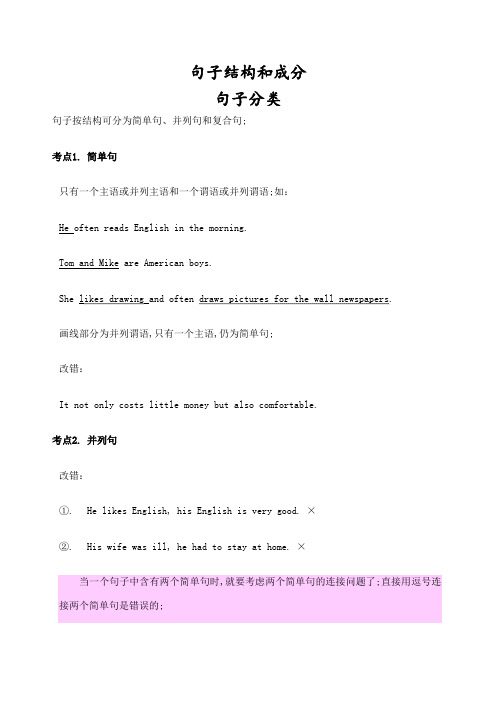
句子结构和成分句子分类句子按结构可分为简单句、并列句和复合句;考点1. 简单句只有一个主语或并列主语和一个谓语或并列谓语;如:He often reads English in the morning.Tom and Mike are American boys.She likes drawing and often draws pictures for the wall newspapers.画线部分为并列谓语,只有一个主语,仍为简单句;改错:It not only costs little money but also comfortable.考点2. 并列句改错:①. He likes English, his English is very good. ×②. His wife was ill, he had to stay at home. ×当一个句子中含有两个简单句时,就要考虑两个简单句的连接问题了;直接用逗号连接两个简单句是错误的;这时我们可以用and, but, or等并列连词来连接这两个句子;也可以用分号;来连接;此时,这两个简单句此时也可称作分句之间是并列关系,不能说一个分句作了另一个分句的什么成分;用并列连词或分号连接起来的句子是并列句;上两句可以改为:①. He likes English;his English is very good. 用分号连接②. He likes English, so/and his English is very good.③. His wife was ill; he had to stay at home. 用分号连接④. His wife was ill, so/and he had to stay at home.考点3. 复合句A.用从属连词连接的句子是复合句;还先看上面的两个错句:①. He likes English, his English is very good. ×②. His wife was ill, he had to stay at home. ×我们还可以用从属连词来连接;这两句话可改为:①. Because he likes English, his English is very good.②. When he likes English, his English is very good.③. Because his wife was ill, he had to stay at home.④. When his wife was ill, he had to stay at home.先看第一个句子;当用because连接时,译为“因为他喜欢英语,所以他的英语非常好”;主要说的是“他的英语非常好”,“他喜欢英语”是他英语好的原因;因此:“his English is very good”是主句,“because he likes English”是原因状语从句;当用when连接时,译为“当他喜欢英语时,他的英语非常好”; 主要说的是“他的英语非常好”,“他喜欢英语”是他英语好的时间;因此,“his English is very good”是主句,“when he likes English”是时间状语从句;同理,句②修改后,前面分别为原因状语从句和时间状语从句,后面是主句;像上面这样,用从属连词连接两个简单句之后,一个句子是主要的主句,另外一个句子从句是说明主要句子发生的时间、原因、条件等,这样构成的句子称为复合句;B.当简单句的一个成分从词或词组变为句子时,整个句子就成为复合句了;从词或词组升级后的句子是从句,除从句以外的是主句,整个句子是复合句;①T he boy over there is my brother. 只有一个主谓结构,是简单句;②T he boy who is wearing a hat is my brother.③当over there变为 who is wearing a hat时,句子就含有两个主谓结构,一个是The boyis my brother,是主句;who is wearing a hat是the boy的定语,称为定语从句;who 既作从句成分,又起着从属连词的作用;④I was doing my homework at six. 只有一个主谓结构,是简单句;⑤I was doing my homework when he came in.⑥I was doing my homework是一个主谓结构,he came in也是一个主谓结构;后面一个主谓结构作前一个的时间状语,是时间状语从句;因此本句是复合句,when是从属连词;⑦It is wrong. 只有一个主谓结构,是简单句;⑧What he said is wrong.⑨what he said,是一个主谓结构;What he said is wrong. 是另外一个主谓结构,What hesaid作主语, is wrong系表结构作谓语,因此,本句是复合句;What he said是主语从句;what既作从句成分又起着从属连词的作用从上面这几个句子,我们可以看出:C.一个句子如果含有从句,如名词性从句主语从句、宾语从句、表语从句和同位语从句、定语从句和状语从句等,这个句子就是复合句;练习1. 判断下列句子是简单句、并列句还是复合句;1.We often study Chinese history on Friday afternoon.2.The boy who offered me his seat is called Tom.3.There is a chair in this room, isn’t there4.My brother and I go to school at half past seven in the morning and come backhome at seven in the evening.5.He is in Class One and I am in Class Two.6.He was fond of drawing when he was yet a child.7.Neither has he changed his mind, nor will he do so.8.What he said at the meeting is very important, isn’t it9.The farmer is showing the boy how to plant a tree.10.Both Tom and Jack enjoy country music.11.Right now it is the summer vacation and I’m helping my Dad on the farm.12.It is the time of year for the rice harvest, so every day I work from dawnuntil dark.13.Sometimes we go on working after dark by the lights of our tractors.14.We grow rice in the south of the States, but in the north where it is colderthey grow wheat.15.Although the farm is large, my Dad has only two men working for him.考点4. 引导的是什么从句,不仅要根据连词,还要根据句子结构和句意来判别练习2. 说出下列复合句中,where引导的是什么从句;1.You can find it where you left it.2.Tell me the address where he lives.3.I don’t know where he comes from.4.Where he was born is not known yet.5.This place is where they once lived.考点5. 一个句子有两个主谓结构时,要考虑它们之间的连接问题直接用逗号连接的两个简单句是错误的;一个句子如果出现两个主谓结构,那它就不是简单句了,要么是并列句,要么是复合句;这时我们就要考虑连接词的问题;这时,我们有三种方法来改正这个错句:A.改为并列句:我们可以使用and, so, but等并列连词来把它们连接起来;或者把逗号改为分号;B.改为复合句:加上从属连词,把其中的一个分句改为状语从句、定语从句或名词性从句;C.改为简单句:把其中的一个主谓结构的谓语破坏掉,从而使其变成独立主格结构;I like English, my English is very good. ×可以改为:并列句:I like English and my English is very good.I like English, so my English is very good.I like English; my English is very good.复合句:As/Because I like English, my English is very good.含有原因状语从句的复合句When I like English, my English is very good.含有时间状语从句的复合句简单句:I liking English, my English is very good.把一个分句改为独立主格结构再如:I have a house, its windows are very big. ×可以改为:并列句:I have a house and/but its windows are very big.I have a house; its windows are very big.复合句:I have a house, whose windows are very big.含有定语从句的复合句考点6. 两个分句一般只用一个连词用了“因为because, as, since等”不用“所以so”;用了“虽然although, though”不用“但是but”;改错:Because I like English, so I am good at it.Although he is not intelligent, but he does well in all his subjects.I.单句改错A.注意分句连接1.2014新课标Ⅰ Although we allow tomato plants to grow in the same place yearafter year, but we have never had any disease or insect attack problems.2.2005天津As she gave it to me, when the phone rang and she went to answer it.3.2006全国ⅠThey did not want breakfast because that they were going out earlyin the morning.4.2004全国ⅡBut I have spent most my money, so I cannot even go out of town. 不要受心理定势影响5.2013 辽宁With little sleep and hardly any break, so he works from morning tillnight.6.2013 新课标ⅠHe had a deep voice, which set him apart from others in our smalltown, he was strong and powerful.7.2009陕西Some friends of his go to see him everyday, they take him lots of goodbooks and fresh fruit.8.My name is Zhang Hong, and 20 years old.B.注意并列成分9.2014大纲卷The understanding between two friends means both of them have similarideas and trusting each other.10.2014新课标ⅡWe can lie on the grass for a rest, or sat by the lake listeningto music.11.2005湖北In other words, they help to keep people strong and feel good.12.2009重庆However, every kind of Chinese food is worth trying, because eachhas a delicious taste and good for health.13.I didn’t communicate with others in English and not willing to practiceit either.14.2012全国大纲ⅠFor example, how many times have you walked out of a roomand leave the lights or television on when no one else was there15.16.17.2008浙江I headed for the company, feeling sure I would easily finish 300envelops in five hours and to earn the money.18.2015课标ⅡA woman saw him crying and telling him to wait outside a shop. II.语法填空每空至多填三词由高考真题中改错题改编19.2004天津At weekends, we would play basketball, ______游泳 in the pool orgo for a picnic.20.21.2004全国ⅡI am thinking of making a trip to London, and ______visittheBritish Museum and some parks.22.2004湖南Then, I put my book under my desk, ______ open it and startedlooking for the answers.23.2004福建She stopped to look out of the window and ______ find a cloud ofsmoke coming out of her neighbor’s house.24.2005浙江At first I was not quite willing to sit down and ______ 观看 the90-minute football match.25.2011浙江I guessed, even at that age, I would never be able to enjoy playingwith the toy or ______ 面对 my cousin again.答案:第1讲简单句、并列句和复合句练习1. 判断下列句子是简单句、并列句还是复合句;1.简单句;2.复合句, The boy is called Tom是一个主谓结构,who offered me his seat也是一个主谓结构,为定语从句,作前一个主谓结构中主语the boy 的定语;3.简单句,反义疑问句;4.简单句,my brother and I 是并列主语,后面go to school和come back为并列谓语,因此也只有一个主谓结构;5.并列句;6.含有时间状语从句的复合句;7.并列句;8.复合句,what he said也是一个主谓结构,名词性从句作主语;9.简单句,只有一个主谓结构;10.简单句,前面为并列主语;11.and连接的并列句;12.由so连接的并列句;13.简单句;14.but连接前后为并列句,但后面又是一个含有定语从句的复合句;15.含有让步状语从句的复合句;练习2. 说出下列复合句中,where引导的是什么从句;1.地点状语从句2.定语从句3.宾语从句4.主语从句5.表语从句练习3. 利用英语句子结构规律做下列各题;1. D2. D3. D4. C5. B6. B7. D8. D1.but去掉或者改为yet;两个简单句用一个连词连接就行,用了“虽然”,不用“但是”,yet可以作副词;2.去掉when;the telephone rang应为主句;3.去掉that;because本身就是连词,不能再用that;4.在my前加of;But是在意思上与前面连接,因此后面用so是正确的;5.去掉so;前面with的复合结构不是一个分句,因此整个句子还是简单句,所以后面不必用连词;6.后句的he前加and;which引导的是定语从句,其前后的两个句子构成了并列句,要有并列连词连接;7.they前加and;两个简单句直接用逗号连接是错误的;8.and后加I’m;20 years old的主语不是My name;9.t rusting改为trust;trust和have是并列的;10.sat改为sit;sit和lie构成并列谓语;11.feel改为feeling;feeling good和strong是并列的,都是作keep的补语;keep 后跟现在分词作补语;12.good前加is;后句中each是主语,has a delicious taste是第一个谓语,is goodfor health是第二个谓语;13.在not前加were;willing是形容词,前面加be才能作谓语;14.leave改为left;left和walked是并列的;15.去to;earn和finish是并列的,所以要用动词原形;16.telling改为told; told和saw是并列关系;17.swim;play, swim和go是并列关系;18.visiting;visiting和making是并列的,都是thinking of的宾语;19.opened;put, opened和started是并列谓语;20.found;found和stopped是并列的;21.watch;watch和sit是并列的;22.face;face和enjoy是并列的;23.Thank you so much for not only giving me life, but also teaching me howto be a good person.24.I particularly enjoy sitting beside you and listening to you tell stories.25.In the past, we had to sit at our desks in silence and pay attention towhat the teachers were saying.26.I still remember getting up early that day and feeling anxious about thenew world.27.I dream of standing on the platform in the classroom and giving lessonsto lovely boys and girls.。
简单句并列句和复合句

• 3、There be 句型 • There be 构造是一种主要旳基本句型,
它由 "There + be + 主语+ 壮语"构成。 There is a book on the desk.
• 桌子上有一本书。
• There is a desk and two chairs in the room. 屋子里有一张桌子两把椅子。
• 并列连词(或连接副词)根据不同含义,分为如下 几类: (1)表达连接,常用旳有and、not only...but also、neither...nor等。
• Right now it‘s the summer vacation and I’m helping my dad on the farm.
• We must rid the house of the rats. • 我们必须赶走屋里旳老鼠。
• (5)主谓宾补构造(S + V + O + C) 在此句式中,V是有宾 语补足语旳及物动词。常带宾语补足语旳词有形容词、副词、 介词短语、名词、不定式、目前分词、过去分词。常见旳可接 宾语补足语旳动词诸多,哪些动词可接哪几种形式作宾补,须 根据动词旳常使用方法而定,不能统而概论。请看下面旳例子。
• 注意:有些动词同步也是及物动词,可构成 SVO句式。
• He looked me up and down.他上下打量我。 He reached his hand to feel the elephant.
• 他伸出手来摸象。
• They are tasting the fish.他们在品尝鱼。 They grow rice in their hometown.
简单句,并列句,复合句
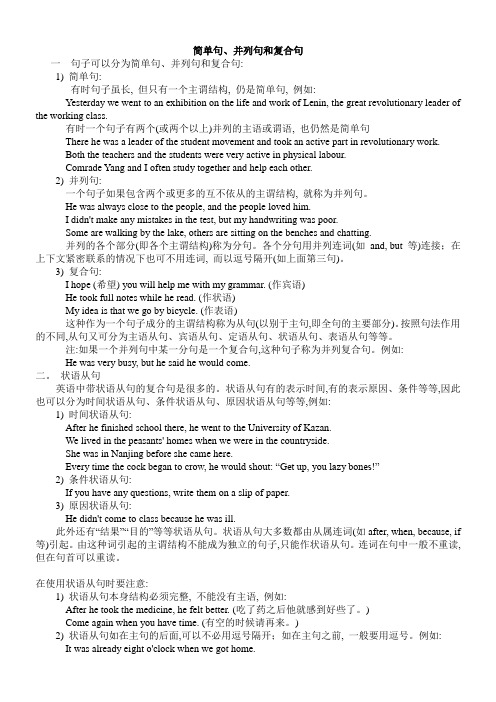
简单句、并列句和复合句一句子可以分为简单句、并列句和复合句:1) 简单句:有时句子虽长, 但只有一个主谓结构, 仍是简单句, 例如:Yesterday we went to an exhibition on the life and work of Lenin, the great revolutionary leader of the working class.有时一个句子有两个(或两个以上)并列的主语或谓语, 也仍然是简单句There he was a leader of the student movement and took an active part in revolutionary work.Both the teachers and the students were very active in physical labour.Comrade Yang and I often study together and help each other.2) 并列句:一个句子如果包含两个或更多的互不依从的主谓结构, 就称为并列句。
He was always close to the people, and the people loved him.I didn't make any mistakes in the test, but my handwriting was poor.Some are walking by the lake, others are sitting on the benches and chatting.并列的各个部分(即各个主谓结构)称为分句。
各个分句用并列连词(如and, but 等)连接;在上下文紧密联系的情况下也可不用连词, 而以逗号隔开(如上面第三句)。
3) 复合句:I hope (希望) you will help me with my grammar. (作宾语)He took full notes while he read. (作状语)My idea is that we go by bicycle. (作表语)这种作为一个句子成分的主谓结构称为从句(以别于主句,即全句的主要部分)。
简单句 并列句 复合句
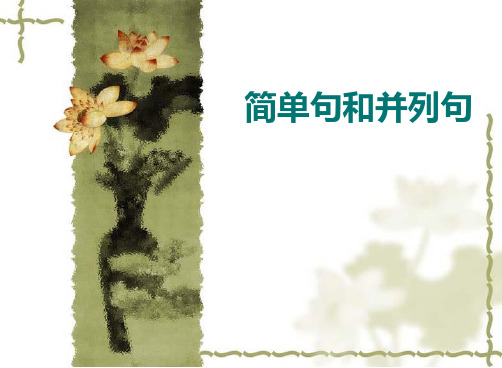
1. 陈述句(Declarative Sentences)
用来说明一个事实或陈述一种看法。例如: 1) Light travels faster than sound.
光比声传播速度快。(说明事实) 2) The film is rather boring.
这部电影很乏味。(说明看法)
要特别注意陈述句的否定结构
6. 状语 ( Adverbial )
常指修饰动词、形容词或副词的成分,修饰动词时 表示动作发生的时间、地点、目的或方式等;修饰 形容词或副词时表示它们的程度等。状语常由副词、 介词短语、动词不定式或分词短语等充当。 例如: 1. The miners work very hard. 2. She often helps Mike at school. 3. Hearing the news, he couldn’t help jumping.
3. 宾语 ( Object )
常指及物动词或介词后面使之意思完整的词或短语。 常由名词、代词、动词不定式或动名词短语等充当。 例如: 1. She has finished doing the experiment. 2. We like English and are good at it.
4. 表语 ( Predicative )
5)主 + 动 + 间宾 + 直宾 例如: My mother made me a new dress. 我母亲给我做了一件新衣裳。
IV. 并列句的常用连词
1. 我们常用并列连词and, not only…but also…等 连接联合并列句,用not only…but also… 时, 前面一句要用部分倒装 。例如: 1)Use your head, and you’ll find a way. 2)Not only does he want to come, but the students also need him.
简单句并列句复合句

能连接并列复合句的副词
• besides 而且,还有 • hence 由此,因此 • nevertherless然而 • moreoever加之,因此 • otherwise 否则,要不然 • then 然后,于是 • therefore 因此,要不然 • then 然后,于是 • therefore因此,所以 • thus 因而,从而 • i am not feeling very well today, otherwise i would do
• 第四种句型: • 主语+动词+间接宾语+直接宾语 • 如:He brings me cookies every day. • They gave him a watch.
• 第五种句型: • 主语+动词+宾语+宾语补足语 • 如:He asked me to answer this question. • We often see him play basketball alone.
• 如:The old woman lives alone, but she never feels lonely.
• we love peace but we are not afraid of war.
第三种:表示选择关系
• 此类并列连词有or, otherwise, either…or…等。
• 第二种句型: • 主语+动词+宾语 • 如:He loves his wife.
• We will always remember the junior high school life.
• 第三种句型: • 主语+连系动词+表语 • 如:I am a winner. • The music sounds nice. • We are in the classmate.
简单句并列句复合句

The Simple, Compound and Complex Sentences简单句、并列句和复合句句子可以分为简单句、并列句和复合句几种形式,分别说明如下:1。
简单句只包含一个主谓结构的句子叫简单句。
如:We have learnt English for 3 years。
我们已经学英语3年了。
Her dream has become a reality.她的梦想成为了现实。
有时一个句子中有两个或两个以上的词担任主语或谓语,这个句子仍是简单句,只是这个简单句的主语或谓语由两个或两个以上的并列的词共同构成。
如:Mary, Mark and Jesse are all from USA。
(三个并列的名词担任主语)玛丽,马克和杰西都来自美国.These electrical appliances, meters and instruments are all good in quality. 这些电气设备,仪表和仪器的质量都很好。
The workers of the shipyard will dismantle the machine, clean its parts and reassemble it。
(三个并列的动词短语担任谓语)船厂的工人将拆卸该机器,清洁其部件,并重新组装.She has won many awards, and has even written a book about her experiences.她赢得了许多奖品并写了一本有关她的经验的书。
2. 并列句包含两个或两个以上的互不依从的主谓结构的句子叫做并列句.如:Our chief engineer ordered some spare parts and the shipchandler will deliver them on board this afternoon.我们轮机长订购了一些备件,今天下午供应商会把它们送到船上来。
简单句及并列句和复合句

一.五种简单句1.主语+不及物动词(主+谓)He laughed.2.主语+及物动词+宾语(主+谓+宾)I like Chinese food.3..主语+及物动词+间接宾语+直接宾语(主+谓+宾1+宾2)She taught them physics.4.主语+及物动词+宾语+宾语补足语(主+谓+宾+宾补)We must keep the room warm.5. 主语+连系动词+表语(主+系+表)The weather is very cold.二.并列句He is a worker and I am a worker, too.He is very happy but his mother is very sad.上述两句地位一样,如同湖北的省长和湖南的省长一样,地位相等,称为并列句。
三.主从复合句If you are free, we will go to Beijing to play.前者地位低,为后面的主句服务,叫从句。
后者地位高,为主句。
两句合二为一,为主从复合句。
问题:主句与从句怎么辨别?四.从句种类很多。
句子成分划分:主语,谓语,宾语,定语,状语,补语,表语,同位语。
(8种)(主语从句,宾语从句,表语从句,同位语从句)-----名词性从句(定语从句)------形容词性从句(状语从句)------副词性从句Whether we will go shopping depends on the weather.( )He said that he wanted to go to town. ( )That is what I wanted. ( )Y ou are the man who I am looking for. ( )I will help you although I am not very rich. ( )The news that Mr.Li will be our new English teacher is true. ( )。
简单句、并列句和复合句的区别

简单句、并列句和复合句的区别在英语中,句子根据句子结构可以分为:简单句、并列句和复合句。
你知道要怎么区别简单句、并列句和复合句吗?接下来,店铺跟你分享简单句、并列句和复合句的区别方法。
如何区分简单句、并列句和复合句简单句、并列句和复合句的区别一、简单句当一个句子只包含一个主谓结构时,我们称之为简单句。
The train(主语) has just touched down(谓语).在英语中,最基本的句型大体上有五种。
1. S+Vi:主语+不及物动词She sat down beside me.2. S+V+P:主语+系动词+表语Mother isn't in at the moment.3. S+Vt+O:主语+及物动词+宾语I hope to finish the work today.4. S+Vt+OI+OD:主语+及物动词+间接宾语+直接宾语My uncle gave me a camera.5. S+Vt+O+C:主语+及物动词+宾语+宾语补足语The news made us sad.备注:S:主语Vi:不及物动词Vt:及物动词O:宾语OD:直接宾语OI:间接宾语C:宾语补足语二、并列句两个或两个以上独立的主谓结构或简单句并列在一起,我们称之为并列句。
各个简单句间是平行并列的关系,而非从属关系。
并列句的各个分句间可用逗号、分号、起连接作用的副词或并列连接词来连接。
1. 能连接并列句的连词and(和,又),but(但是),for(因为),however(然而),or(或者),so(所以,因而),while(然而),yet(然而)2. 能连接并列句的复合连词or else(否则,要不然),either...or...(要么···,要么···;或者···,或者···),neither...nor...(既不···,也不···),not only...but also(不仅···,而且···)3. 能连接并列句的副词besides(而且,还有),hence(因此),otherwise(否则,要不然),then(然后,于是),therefore(因此,所以),thus(因而,从而) 根据并列分句之间的不同关系,并列句则可以分为以下四种。
简单句,并列句,复合句

十、简单句1、简单句的特点:简单句通常只由一个主语(或并列主语)和一个谓语(或并列谓语)构成。
2、简单句的种类:简单句一般分为陈述句、疑问句、感叹句和祈使句四种。
3、陈述句:用来说明一个事实的句子叫陈述句。
它有肯定式和否定式两种形式。
▲陈述句的肯定式:He is a middle school student.(他是个中学生)/ I have a hammer in my hand.(我手上有把锤子)/ She teaches us geography.(她教我们地理)/ The new play was good enough and everybody enjoyed it.(新的话剧非常好大家都喜欢)▲陈述句的否定式:1)谓语动词如果是be 、助动词、情态动词时,在它们的后面加“not”。
如:My brother is nota teacher.(我的弟弟不是教师)/ He does not have a cousin.(他没有堂兄弟)/ I will not go there tomorrow.(明天我不去那儿)/ My mother is not cooking a meal in the kitchen.(我母亲现在不在厨房里做饭)/ You must not make such mistakes again.(你不该再犯类似错误了)/ We haven’t discussed the question yet(我们还没有讨论那个问题呢).2)谓语动词如果没有上述词语而是其他动词时,须在它的前面加do not(don’t).如:I don’t know anything about it.(此事我一无所知) / Li Ming does not feed pigs in the countryside.(李明不在农村养猪)/ We didn’t expect to meet her right here.(我们没指望着在这里见到她)/ We didn’t have a meeting yesterday afternoon.(昨天下午我们没有开会)3)如果“have”作“有”讲,也可以在它后面加not构成否定式,其形式与have got的否定式相同。
简单句并列句复合句
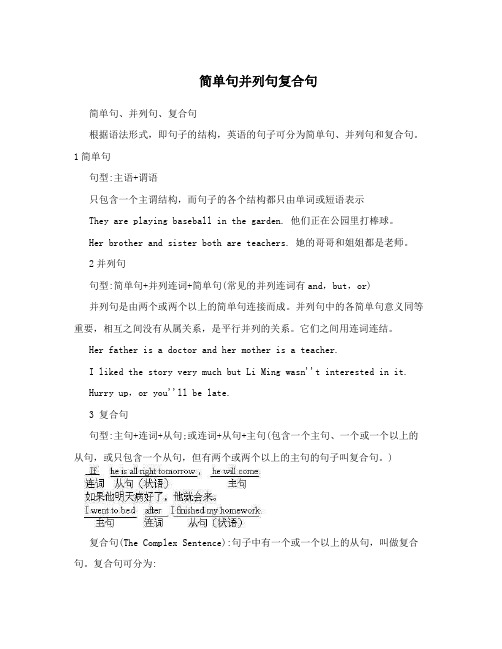
简单句并列句复合句简单句、并列句、复合句根据语法形式,即句子的结构,英语的句子可分为简单句、并列句和复合句。
1简单句句型:主语+谓语只包含一个主谓结构,而句子的各个结构都只由单词或短语表示They are playing baseball in the garden. 他们正在公园里打棒球。
Her brother and sister both are teachers. 她的哥哥和姐姐都是老师。
2并列句句型:简单句+并列连词+简单句(常见的并列连词有and,but,or)并列句是由两个或两个以上的简单句连接而成。
并列句中的各简单句意义同等重要,相互之间没有从属关系,是平行并列的关系。
它们之间用连词连结。
Her father is a doctor and her mother is a teacher.I liked the story very much but Li Ming wasn''t interested in it.Hurry up,or you''ll be late.3 复合句句型:主句+连词+从句;或连词+从句+主句(包含一个主句、一个或一个以上的从句,或只包含一个从句,但有两个或两个以上的主句的句子叫复合句。
)复合句(The Complex Sentence):句子中有一个或一个以上的从句,叫做复合句。
复合句可分为:1).定语从句(The Attributive Clause);2).状语从句(The Adverbial Clause);3).名词性从句(The Noun Clause):一、定语从句, 定语从句的定义定语从句在句子中作定语,用来修饰一个名词、名词词组或者代词。
, 先行词和引导词被修饰的名词、名词词组或代词叫做先行词;在先行词和定语从句之间起连接作用的词叫做引导词。
引导词分为“关系代词”和“关系副词”。
, 关系代词和关系副词关系代词有:who, whom, whose, that, which, as。
简单句、并列句和复合句

简单句、并列句和复合句句子按结构可分为简单句、并列句和复合句。
复合句中包含宾语从句、状语从句或定语从句等。
◆一简单句简单句就是只包含一个主谓结构的句子,其句式结构主要有五种:①主 + 谓。
He works in a big company. 他在一家大公司工作。
②主 + 系 + 表。
She is a kind girl. 她是一个善良的女孩。
③主 + 谓 + 宾。
Ann eats junk food twice a week .安一周吃两次垃圾食品。
④主 + 谓 + 间宾 + 直宾。
He gave me a pen .他给我一支钢笔。
⑤主 + 谓 + 宾 + 宾补。
He kept me waiting for two hours .他让我等了两小时。
◆二并列句并列句由两个或两个以上的简单句连接而成。
并列句中的各简单句同等重要,没有从属关系,是并列的关系,之间用并列连词连接。
1. 表示顺承的并列连词有and / not only …but (also)等。
如:She not only gaveus a lot of advice, butalso helped us to overcome difficulties .他不仅给了我们很多建议,而且还帮助我们克服困难。
2. 表示选择的并列连词有or,either …or …等。
如:Either you or Maria will haveto go .你或玛丽亚得去一趟。
3. 表示转折的并列连词有but,yet,however 等。
如:It is hot in summer here , butit’s not cold in winter .这里夏天热,但冬天不冷。
4. 表示因果关系的并列连词有so,如:He works hard , so he is one of the topstudents in our class .因为他学习努力,所以他是我们班最优秀的学生之一。
英语句子成分及分类:简单句-并列句和复合句
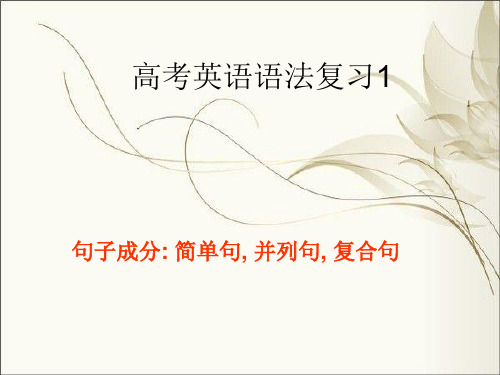
练习一
• 一、指出下列句子划线部分是什么句子成 分:
• 1. The students got on the school bus. • 2. He handed me the newspaper. • 3. I shall answer . What a beautiful Chinese painting! • 5. They went hunting together early in the
(五)宾语补足语
• 英语中有些及物动词,除有一个直接宾语 以外,还要有一个宾语补语,才能使句子 的意义完整。带有宾语补足语的一般句型 为:某些及物动词(如make等+宾语+宾 补)。宾补可由名词、形容词、副词、不 定式、分词、介词短语和从句充当。例如:
1. His father named him Dongming.(名词) 2. They painted their boat white.(形容词) 3. Let the fresh air in.(副词)
• 2、复合谓语:(1)由情态动词或其他助动 词加动词原形构成。如:You may keep the book for two weeks. He has caught a bad cold. (2) 由系动词加表语构成。如:We are students.
(三)表语
• 表语用以说明主语的身份、特征和状态, 它一般位于系动词(如be, become, get, look, grow, turn, seem等)之后。表语一般 由名词、代词、形容词、分词、数词、不 定式、动名词、介词短语、副词及表语从 句表示。例如:
morning.
• 6. His job is to train swimmers. • 7. He took many photos of the palaces in
简单句、并列句、复合句
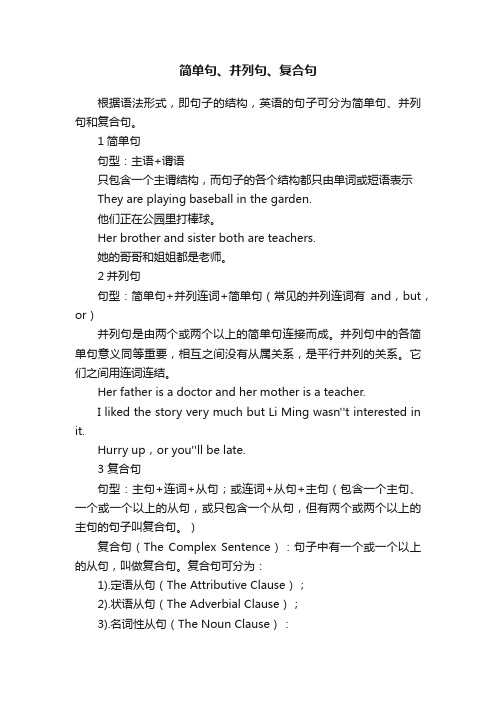
简单句、并列句、复合句根据语法形式,即句子的结构,英语的句子可分为简单句、并列句和复合句。
1简单句句型:主语+谓语只包含一个主谓结构,而句子的各个结构都只由单词或短语表示They are playing baseball in the garden.他们正在公园里打棒球。
Her brother and sister both are teachers.她的哥哥和姐姐都是老师。
2并列句句型:简单句+并列连词+简单句(常见的并列连词有and,but,or)并列句是由两个或两个以上的简单句连接而成。
并列句中的各简单句意义同等重要,相互之间没有从属关系,是平行并列的关系。
它们之间用连词连结。
Her father is a doctor and her mother is a teacher.I liked the story very much but Li Ming wasn''t interested in it.Hurry up,or you''ll be late.3 复合句句型:主句+连词+从句;或连词+从句+主句(包含一个主句、一个或一个以上的从句,或只包含一个从句,但有两个或两个以上的主句的句子叫复合句。
)复合句(The Complex Sentence):句子中有一个或一个以上的从句,叫做复合句。
复合句可分为:1).定语从句(The Attributive Clause);2).状语从句(The Adverbial Clause);3).名词性从句(The Noun Clause):一、定语从句定语从句的定义定语从句在句子中作定语,用来修饰一个名词、名词词组或者代词。
先行词和引导词被修饰的名词、名词词组或代词叫做先行词;在先行词和定语从句之间起连接作用的词叫做引导词。
引导词分为“关系代词”和“关系副词”。
关系代词和关系副词关系代词有:who, whom, whose, that, which, as。
第七讲简单句并列句和复合句

目 录 首 页 上一页 下一页 末 页
宇轩图书
考
点
知
(2)主系表型(S+V+P)
识
句中的谓语由连系动词加上表语构成。此类简单句主要反映事物的性质、特征或状态。
精 如:
讲
直 击 考 点 训 练
目 录 首 页 上一页 下一页 末 页
宇轩图书
考
点
知
识
精
讲
This piece of music ________ beautiful.
waiting for two hours. C
现在分词
直
他让我等了两个小时。
击
考
点
训 练
目 录 首 页 上一页 下一页 末 页
宇轩图书
考
点
知
识
精
讲
The talk show on TV is very popular. It often makes people ________.
A.laugh
A.looks
B.sounds
C.tastes
D.smells
【解析】本题考查系动词的用法。句意为“这首曲子听起来很美妙。”故用 sounds,应 选 B。
直 击 考 点 训 练
目 录 首 页 上一页 下一页 末 页
宇轩图书
考
(3)主谓宾型(S+Vt+O)
点
此类简单句中,句子的谓语动词为及物动词,其后接名词、代词或相当于名词的词、短
D.so
【解析】句意为“认真些,否则你会错过正确答案。”故用 or,应选 B。
直 击 考 点 训 练
目 录 首 页 上一页 下一页 末 页
宇轩图书
简单句、并列句和复合句讲解与练习精选全文

e.g. He is a student. The dish tastes delicious. 注:其他各种句子都可由这几种基本句型扩展、变化或省略而构成。
简单句、并列句和复合句
二、并列句:由__并__列___连词(_a_n_d_,_b_u_t_,_o_r_等_)或_分__号__(___;__)_把两个或两个以上
I’m busy, so I can’t go with you.
三、复合句:
简单句、并列句和复合句
包含两个或多个主谓结构,并且,其中一个主谓结构充当主句,另一个或多个主谓结构为从句,
充当该主句的__主___语、___宾___语、__表___语、__同__位___语、_定____语或__状___语,这样的句子叫
简单句、并列句和复合句
(一)简单句的五种基本句型
1、_主___语___+__谓__语___ (vi.)
e.g. The car is running fast. They worked day and night.
2、_主___语___+__谓__语___ (vt.) +__宾__语___
e.g. Henry bought a dictionary. We can play the piano.
【高考考点】 1、简单句的五大句型是最基本的句型。虽然近几年单纯考查这种基础句型的题 不多,但是在阅读中有时需借助于划分句子成分去理解,在书面表达中,没有最 基本的遣词造句的能力是不可能用地道的英语句子来表达清楚的。 2、高考对简单句、并列句和各种复合句的考查常表现在对连词的选择和使用上 。如:and, but, or, while以及其它连接名词性从句、定语从句和状语从句的连接 词、关联词。 3、各种主从复合句的考查常常与动词的时态联系在一起,以宾语从句与状语从 句最为明显,时间从句与条件从句中,如果主句是将来时,从句则用一般式表将 来,这一点在高考中经常考查。 如:We will go outing if it doesn’t rain tomorrow。
(完整版)简单句、并列句、复合句、并列复合句
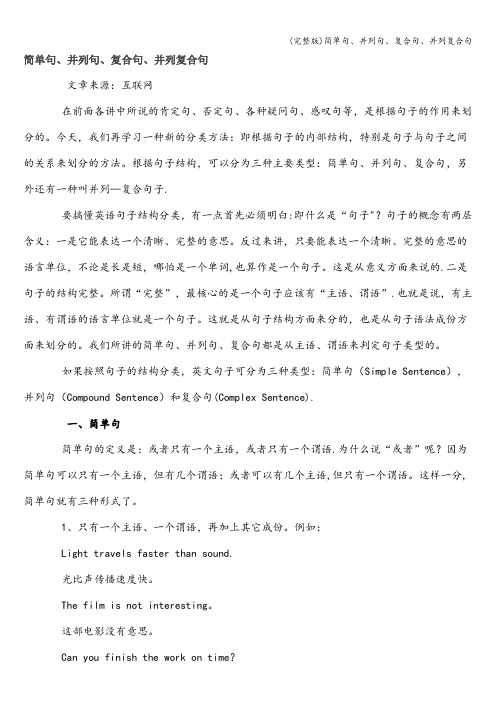
简单句、并列句、复合句、并列复合句文章来源:互联网在前面各讲中所说的肯定句、否定句、各种疑问句、感叹句等,是根据句子的作用来划分的。
今天,我们再学习一种新的分类方法:即根据句子的内部结构,特别是句子与句子之间的关系来划分的方法。
根据句子结构,可以分为三种主要类型:简单句、并列句、复合句,另外还有一种叫并列—复合句子.要搞懂英语句子结构分类,有一点首先必须明白:即什么是“句子"?句子的概念有两层含义:一是它能表达一个清晰、完整的意思。
反过来讲,只要能表达一个清晰、完整的意思的语言单位,不论是长是短,哪怕是一个单词,也算作是一个句子。
这是从意义方面来说的.二是句子的结构完整。
所谓“完整”,最核心的是一个句子应该有“主语、谓语”.也就是说,有主语、有谓语的语言单位就是一个句子。
这就是从句子结构方面来分的,也是从句子语法成份方面来划分的。
我们所讲的简单句、并列句、复合句都是从主语、谓语来判定句子类型的。
如果按照句子的结构分类,英文句子可分为三种类型:简单句(Simple Sentence),并列句(Compound Sentence)和复合句(Complex Sentence).一、简单句简单句的定义是:或者只有一个主语,或者只有一个谓语.为什么说“或者”呢?因为简单句可以只有一个主语,但有几个谓语;或者可以有几个主语,但只有一个谓语。
这样一分,简单句就有三种形式了。
1、只有一个主语、一个谓语,再加上其它成份。
例如:Light travels faster than sound.光比声传播速度快。
The film is not interesting。
这部电影没有意思。
Can you finish the work on time?你能按时完成工作吗?2、只有一个主语,但有几个谓语,再加上其它成份。
例如:The boy were running, shouting and laughing.男孩们一边跑,一边笑,一边喊叫着。
英语简单句并列句复合句

名师手记之: 英语篇(简单句、并列句和复合句)1.简单句、并列句和复合句① 句子种类两种分类法按照句子的用途, 英语的句子可分: 陈述句(肯定、否定)、疑问句(一般、特殊、选择、反意)、祈使句、感叹句等四种。
按照句子的结构可分: 简单句并列句和复合句三种。
简单句只有一个主语或并列主语和一个谓语或并列谓语。
并列句由并列连词and, but, or, so等)或分号(;)把两个或两个以上的简单句连在一起构成。
复合句:含有一个或一个以上从句的句子。
复合句包含:状语从句\名词性从句(主语从句、宾语从句、表语从句和同位语从句)和定语从句等三种。
② 并列句的分类并列句指把两个同等重要的句子连接在一起, 句子之间常用and, not only…but also…, neither…nor…, then等并列连词连接。
表示选择关系常用的连词有: or, either…or…, otherwise等表示转折关系常用的连词有: but, still, however, yet, while, when 等。
表示因果关系常用的连词有: so, for, therefore等。
2.状语从句:(1)状语从句的分类状语从句通常修饰主句的动词或整个句子, 由从属连词引导, 从属连词在从句中不充当句子成分。
根据状语从句所表达的不同意义和功能, 可分为时间、地点、原因、条件、目的、结果、让步、比较、方式等状语从句。
(2)连接状语从句的词语时间状语从句: when, whenever每当……, after, before, as, as soon as, hardly/ scarcely...when..., no sooner...than.。
.一……就……, while, till, until, since, once。
名词词组the first time第一次, last time最后一次, every/each time每次, the next time下次, the next day第二天, the moment, the minute, the second, the instant 一……就……;副词immediately, instantly, directly等也可作连词使用。
- 1、下载文档前请自行甄别文档内容的完整性,平台不提供额外的编辑、内容补充、找答案等附加服务。
- 2、"仅部分预览"的文档,不可在线预览部分如存在完整性等问题,可反馈申请退款(可完整预览的文档不适用该条件!)。
- 3、如文档侵犯您的权益,请联系客服反馈,我们会尽快为您处理(人工客服工作时间:9:00-18:30)。
二、简单句、并列句和复合句(一)句子种类两种分类法1、按句子的用途可分四种:1)陈述句(肯定、否定):He is six years old; She didn't hear of you before.2)疑问句(一般、特殊、选择、反意):Do they like skating? How old is he? Is he six or seven years old? Mary can swim, can't she?3)祈使句:Be careful, boys; Don't talk in class4)感叹句:How clever the boy is!2、按句子的结构可分三种:1)简单句:只有一个主语(或并列主语)和一个谓语(或并列谓语)。
e.g. He often reads English in the morning.Tom and Mike are American boys.She likes drawing and often draws pictures for the wall newspapers.2) 并列句:由并列连词(and, but, or等)或分号(;)把两个或两个以上的简单句连在一起构成。
e.g. You help him and he helps you.The future is bright; the road is tortuous. 前途是光明的,道路是曲折的。
3)复合句:含有一个或一个以上从句的句子。
复合句包含:名词性从句(主语从句、宾语从句、表语从句和同位语从句)、定语从句和状语从句等。
e.g. The foreign visitors took a lot of pictures when they were at the Great Wall.(二)简单句的五种基本句型1、主语+系动词+表语:e.g. He is a student.2、主语+不及物动词:e.g. We work.3、主语+及物动词+宾语:e.g. Henry bought a dictionary.4、主语+及物动词+双宾语(间接宾语+直接宾语):e.g. My father bought me a car.5、主语+及物动词+复合宾语(宾语+宾补):e.g. Tom made the baby laugh.注:其他各种句子都可由这一种基本句型扩展、变化或省略而构成。
(三)并列句的分类1、表示连接两个同等概念,常用and, not only…but also…, neither…nor…, then等连接。
e.g. The teacher's name is Smith, and the student's name is John.2、表示选择,常用的连词有or, either…or…, otherwise等。
e.g. Hurry up, or you'll miss the train.3、表示转折,常用的连词有but, still, however, yet, while, when等。
e.g. He was a little man with thick glasses, but he had a strange way of making his classes lively and interesting.4、表示因果关系,常用的连词有so, for, therefore等。
e.g. August is the time of the year for rive harvest, so every day I work from dawnuntil dark.(四)高考考点探讨1、简单句的五大句型是最基本的句型。
虽然近几年单纯考查这种基础句型的题不多,但是在阅读中有时需借助于划分句子成分去理解,在书面表达中,没有最基本的遣词造句的能力是不可能用地道的英语句子来表达清楚的。
2、祈使句、反意疑问句和感叹句是高考命题的热点之一。
有时把祈使句与反意疑问句结合于一体来考查。
一个题目,几个考点,是近几年命题的发展趋势。
3、高考对简单句、并列句和各种复合句的考查常表现在对连词的选择和使用上。
如:and, but, or, while,以及其它连接名词性从句、定语从句和状语从句的连接词、关联词。
4、各种主从复合句的考查常常与动词的时态联系在一起,以宾语从句与状语从句最为明显,时间从句与条件从句中,如果主句是将来时,从句则用一般式表将来,这一点在高考中经常考查。
如:We will go outing if it doesn't rain tomorrow。
练习二、简单句、并列句和复合句一、判断下列句子是简单句、并列句还是复合句:1. We often study Chinese history on Friday afternoon.2. The boy who offered me his seat is called Tom.3. There is a chair in this room, isn't there?4. My brother and I go to school at half past seven in the morningand come back home at seven in the evening.5. He is in Class One and I am in Class Two.6. He was fond of drawing when he was yet a child.7. Neither has he changed his mind, nor will he do so.8. What he said at the meeting is very important, isn't it?9. The farmer is showing the boy how to plant a tree.10. Both Tom and Jack enjoy country music.二、判断下列短文中各句是简单句、并列句还是复合句:I hope you are very well( ). I'm fine, but tired( ). Right now it is the summer vacation and I'm helping my Dad on the farm( ). August is the hottest month here( ). It is the time of year for the rice harvest, so every day I work from dawn until dark.( ) Sometimes we go on working after dark by the lights of our tractors( ). We grow rice in the south of the States, but in the north where it is colder they grow wheat( ). We have a lot of machines on the farm( ). Although the farm is large, my Dad has only two men working for him( ). But he employs more men for the harvest( ). My brother takes care of the vegetable garden( ). It doesn't often rain in the summer here( ). As a result, we have to water the vegetable garden( ). Every evening we pump water from a well( ). It then runs along channels to different parts of the garden( ).Most Saturday evenings there is a party, even at harvest time( ).These parties often make us very happy( ). We cook meat on an open fire outside( ). It's great( )! Americans eat a lot of meat - too much in my opinion( ). Some of my friends drink beer( ). I don't, because I have to drive home after the party( ). In your letter you asked about the time in different areas of the States( ). There are five different time areas in the States( ). In my state we are fourteen hours behind Beijing time( ). How many different time areas do you have in China( )? Well, I must stop and get some sleep( ). Please give my best regards to your parents( ).三、选择填空:1. Give me one more minute ____ I'll be able to finish it.A. andB. orC. ifD. so2. It's the third time that John has been late, ____?A. hasn't heB. isn't heC. isn't itD. hasn't it3. ____ joyful he was to meet his brother again!A. HowB. WhatC. What aD. What an4. Let us pass, ____?A. shan't weB. shall weC. won't weD. will you5. I suppose he's serious, ____ ?A. do IB. don't IC. is heD. isn't he6. You had better not smoke here, ____?A. will youB. had youC. shall youD. have you7. Train as hard as you can ____ you'll win the swimming competition.A. thenB. butC. andD. or8. I'm sorry to have to say this, ____ you forgot to turn off the lights when you left the room last night.A. andB. butC. soD. because9. John has not yet passed the driving test, and ____.A. Henry hasn't tooB. Henry also has not eitherC. neither Henry hasD. neither has Henry10. There are many sports lovers in his office. Some love climbing, ____ others enjoy swimming.A. orB. forC. whileD. so11. ---- Do you feel like going out ____ would you rather have dinner at home?---- I'd like to go out. A. or B. and C. but D. so12. ---- "____ is the temperature today?" ----"It's 38 degrees."A. WhichB. HowC. How hotD. How high13. ---- Your uncle isn't an engineer, is he? ---- ____.A. Yes, he isn'tB. No, he isn'tC. No, he isD. He is14. ____ friendly ____ to everyone!A. How, is sheB. What, is sheC. How, she isD. What, she is15. Mary went to bed early, ____ she felt very tired.A. orB. soC. forD. yet16. Mother ____ a dress when she cut her finger.A. was makingB. makesC. is makingD. made17. He lay in bed ____ read something borrowed from library.A. butB. andC. orD. yet18. ---- I'd really like some lunch but I have so much work to do.---- ____ what you want and I can get it for you.A. Tell meB. If you would say to meC. You will tell meD. If you tell me19. As he is strong, ____ can lift one hundred pounds.A. yet heB. but heC. andD. he20. ---- I thought you had an umbrella. ---- I had, ____ I've lost it.A. sinceB. butC. becauseD. so21. ____ down the radio ---- the baby's asleep in the next room.A. TurningB. To turnC. TurnedD. Turn22. ---- I don't like chicken ____ fish. ---- I don't like chicken ____ I like fish very much.A. and, andB. and, butC. or, andD. or, but23. ---- Would you like to come to dinner tonight? ---- I'd like to, ____ I'm too busy.A. andB. soC. asD. but24. Would you like a cup of coffee ____ shall we get down tobusiness right away?A. andB. thenC. orD. otherwise25. She set out soon after dark ____ home an hour later.A. arrivingB. to arriveC. having arrivedD. and arrived26. "Can't you read?" Mary said ____ to the notice.A. angrily pointingB. and point angrilyC. angrily pointedD. and angrily pointed27. She thought I was talking about her daughter, ____, in fact, I was talking about my daughter.A. whomB. whereC. whichD. while28. ____ it with me and I'll see what I can do.A. When leftB. LeavingC. If you leaveD. Leave29. ---- Alice, you feed the bird today, ____? ---- But I fed it yesterday.A. do youB. will youC. didn't youD. don't you30. ____ him and then try to copy what he does.A. MindB. Glance atC. Stare atD. Watch四、按要求完成下列句子:1. He dares to tell the truth.(改为否定句)2. They have lived here for more than ten years.(对画线部分提问)3. There will be a sports meet at the end of this month, ____________?(完成反意疑问)4. You must be careful with your pronunciation.(改为祈使句)5. They went for a walk after supper yesterday evening.(改为一般疑问句)6. It is an interesting story.(改为感叹句)7. This magazine comes out(出版)every other week.(对画线部分提问)8. They could hardly believe his words, ____________?(完成反意疑问)9. The moon is shining brightly.(改为感叹句)10.Our English teacher is always encouraging us to speak English in class. (对画线部分提问)答案:练习一:一、1、主语,定语;2、间接宾语;3、谓语,状语;4、定语;5、状语,状语;6、定语,表语;7、宾语,状语;8、谓语,主语;9、谓语;10、主语,表语;11、谓语,宾语;12、状语;13、形式宾语,真正宾语;14、宾语、定语;15、插入语,状语;16、宾语(间宾+直宾);17、状语,状语;18、形式主语,表语,宾补;19、宾补;20、表语二、略三、略四、1~5 CBDBB 6~10 ACBAB练习二:一、1、简单句;2、复合句;3、简单句;4、简单句;5、并列句;6、复合句;7、并列句;8、复合句;9、简单句;10、简单句二、I hope you are very well(复合句). I'm fine, but tired(简单句). Right now it is the summer vacation and I'm helping my Dad on the farm(并列句). August is the hottest month here(简单句). It is the time of year for the rice harvest, so every day I work from dawn until dark.(并列句) Sometimes we go on working after dark by the lights of our tractors(简单句). We grow rice in the south of the States, but in the north where it is colder they grow wheat(并列复合句). We have a lot of machines on the farm(简单句). Although the farm is large, my Dad has only two men working for him(复合句). But he employs more men for the harvest(简单句). My brother takes care of the vegetable garden(简单句). It doesn't often rain in the summer here(简单句). As a result, we have to water the vegetable garden(简单句). Every evening we pump water from a well(简单句). It then runs along channels to different parts of the garden(简单句). Most Saturday evenings there is a party, even at harvest time(简单句). These parties often make us very happy(简单句). We cook meat on an open fire outside(简单句). It's great( 简单句)! Americans eat a lot of meat - too much in my opinion(简单句). Some of my friends drink beer(简单句). I don't, because I have todrive home after the party(复合句). In your letter you asked about the time in different areas of the States(简单句). There are five different time areas in the States(简单句). In my state we are fourteen hours behind Beijing time(简单句). How many different time areas do you have in China(简单句)? Well, I must stop and get some sleep(简单句). Please give my best regards to your parents(简单句).三、1~5 ACADD 6~10 BCBDC 11~15 ADBCC 16~20 ABADB 21~25 DDDCD 26~30 ADDBD四、1. He doesn't dare to tell the truth. 或He dare not tell the truth.2. How long have they lived here?3. won't there4. Be careful with your pronunciation.5. Did they go for a walk after supper yesterday evening?6. What an interesting story (it is)! 或How interesting the story is!7. How often does this magazine come out?8. could they9. How brightly the moon is shining! 10. Who is always encouraging us to speak English in class?。
